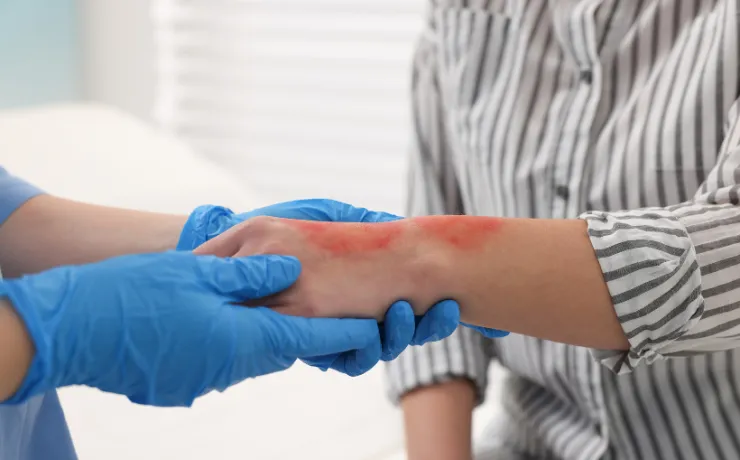What to Do After a Minor Burn – First Aid from Your Pharmacy

Burns are a common household injury, often caused by hot liquids, steam, cooking mishaps, or brief contact with hot objects. While severe burns require emergency care, many minor burns can be safely managed at home with the right first aid steps and pharmacy support.
At Central Pharmacy, we want our patients to feel confident about caring for minor burns. In this guide, we’ll walk through immediate first aid, helpful over-the-counter products, and safe recovery practices.
Understanding Minor Burns
Burns are categorized based on how deeply the skin is affected:
-
First-degree burns affect only the outer layer of skin. They cause redness, mild swelling, and pain.
-
Second-degree burns (superficial) reach the second layer of skin, often causing redness, blistering, and more intense pain.
Minor burns usually fall into these categories. They can be treated at home unless they cover a large area or involve sensitive places such as the face, hands, or joints.
Step 1: Cool the Burn Immediately
The first step after a minor burn is to cool the skin:
-
Place the burned area under cool (not cold) running water for 10–20 minutes.
-
If running water isn’t available, use a clean, cool compress.
-
Avoid ice or very cold water, as this can damage the skin further.
Cooling helps reduce pain, limit swelling, and prevent the burn from worsening.
Step 2: Gently Clean the Area
After cooling, carefully wash the burn with mild soap and water. This removes any dirt or debris without irritating the skin.
-
Pat the area dry gently with a clean cloth.
-
Do not rub, as this may worsen irritation.
Keeping the burn clean is an important step in preventing infection.
Step 3: Protect the Burn
Minor burns heal best when they are protected and kept moist. At your local pharmacy, you can find over-the-counter options such as:
-
Soothing gels or creams that help hydrate the skin
-
Protective ointments to prevent dryness
-
Sterile dressings or non-stick bandages to cover the burn
Avoid using butter, oils, or home remedies that may trap heat or increase the risk of infection.
Step 4: Manage Pain and Discomfort
Burns can be painful, even when minor. Over-the-counter options may provide relief:
-
Pain relievers help reduce discomfort
-
Topical cooling gels may provide a soothing effect
Always follow label directions and speak with a pharmacist if you are unsure which product is best for you.
Step 5: Support Healing Naturally
Your body needs the right environment to heal. Along with pharmacy products, you can promote recovery by:
-
Staying hydrated to support skin repair
-
Avoiding sun exposure on the burned area
-
Keeping the wound covered until it heals fully
-
Wearing loose clothing to prevent friction on the burn
Healing time varies, but most minor burns improve within a week or two.
When to Seek Medical Help
Even if a burn seems minor, sometimes professional care is needed. Contact a healthcare provider if:
-
The burn is larger than the size of your palm
-
It affects the face, hands, feet, or genitals
-
Blisters are very large or become infected (with pus, swelling, or spreading redness)
-
Pain is severe or does not improve with basic care
-
The burn does not heal within two weeks
Knowing when to seek help is just as important as first aid.
Pharmacy Support for Burn Care
Pharmacists are an excellent resource for guidance on safe over-the-counter burn care. At Central Pharmacy, our team can:
-
Recommend soothing products to ease pain and promote healing
-
Suggest protective dressings and bandages
-
Help you choose appropriate pain relief options
-
Provide tips on wound care and recovery
Pharmacists can also let you know when a burn may need professional medical attention.
Preventing Future Burns
While accidents happen, many burns can be prevented with a few safety habits:
-
Use oven mitts and pot handles turned inward when cooking
-
Keep hot liquids out of reach of children
-
Test bath water before getting in
-
Be mindful of heat tools like irons, hair straighteners, and curling wands
Practicing caution in daily routines helps lower the risk of burns for the whole family.
Final Thoughts
Minor burns can often be treated safely at home with simple first aid steps: cooling, cleaning, protecting, and managing discomfort. Pharmacy products such as soothing gels, protective ointments, and non-stick bandages can make recovery easier and more comfortable.
At Central Pharmacy, we’re here to provide guidance, recommend safe products, and support your healing journey. If you’re unsure about a burn or need advice on care, visit us for expert help.
Snippet From our blog
Explore helpful tips, expert insights, and the latest health updates on our blog. Find practical advice and resources to support a healthier life.